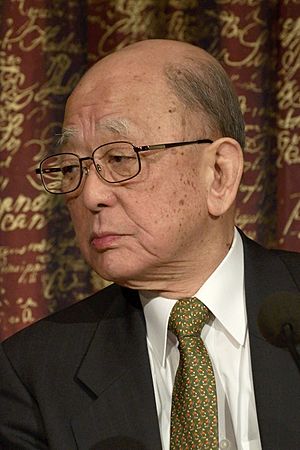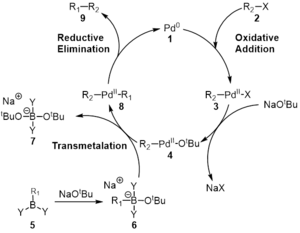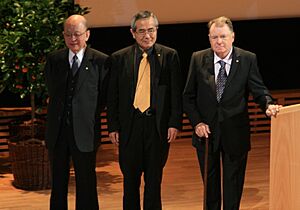Akira Suzuki facts for kids
Quick facts for kids
Akira Suzuki
|
|
|---|---|

Suzuki in 2010
|
|
| Born | September 12, 1930 Mukawa, Hokkaido, Japan
|
| Alma mater | Hokkaidō University |
| Known for | Suzuki reaction |
| Awards |
|
| Scientific career | |
| Institutions |
|
Akira Suzuki (鈴木 章, Suzuki Akira, born September 12, 1930) is a famous Japanese chemist. He won the Nobel Prize in Chemistry in 2010. He is best known for discovering a special chemical reaction called the Suzuki reaction in 1979. This reaction helps chemists build new and useful molecules.
Contents
Early Life and Learning
Akira Suzuki was born in Mukawa, Hokkaidō, Japan, on September 12, 1930. When he was a kid, he really liked math. He wanted to study mathematics in college.
But then he read two important chemistry books. These books made him interested in organic chemistry. This is the study of molecules that contain carbon. He decided to study chemistry instead.
He went to Hokkaido University in Japan. He earned his PhD there. After that, he became an assistant professor at the same university.
A Career in Chemistry
From 1963 to 1965, Suzuki worked at Purdue University in the United States. He was a special student called a postdoctoral researcher. He worked with a famous chemist named Herbert C. Brown.
After this, he went back to Hokkaido University. He became a full professor there. He used what he learned at Purdue to study how to connect different molecules.
Discovering the Suzuki Reaction
In 1979, Professor Suzuki and his assistant, Norio Miyaura, made an important discovery. They found a new way to join molecules together. This method is now called the Suzuki reaction.
The Suzuki reaction uses special chemicals called boronic acids. These acids are easy to work with. They are stable in air and water. This makes the Suzuki reaction very useful for chemists. It helps them create many new substances.
Life After Hokkaido University
Professor Suzuki retired from Hokkaido University in 1994. But he kept working at other universities. He taught at Okayama University of Science from 1994 to 1995. Then he taught at Kurashiki University of Science and the Arts from 1995 to 2002.
He also visited other universities as a special professor. These included Purdue University in 2001.
Winning the Nobel Prize
In 2010, Akira Suzuki won the Nobel Prize in Chemistry. He shared the prize with two other chemists. They were Richard F. Heck and Ei-ichi Negishi. They all won for their work on "palladium-catalyzed cross couplings." This is a fancy way of saying they found new ways to connect molecules using a metal called palladium.
In 2011, Professor Suzuki was interviewed by a magazine. He talked about how important chemistry is. He said that chemistry helps us have the life we know today. He also said that chemists must work to create new substances that are good for the environment.
In 2014, a student asked him for advice. The student wanted to know how to become a great chemist. Professor Suzuki told him: "... above all else, you must learn to see through the appearance to perceive the essence." This means to look beyond what you see and understand the real meaning.
A Gift to Science
Akira Suzuki did not get a patent for the Suzuki reaction. A patent would have given him special rights to his invention. He believed that his research was supported by government money. So, he wanted the discovery to be free for everyone to use.
Because of this, the Suzuki reaction became very popular. Many scientists and companies use it. More than 6,000 scientific papers and patents are related to this reaction. It has helped create many new products.
Awards and Honors
Professor Suzuki has received many awards for his important work.
- 1986 – Weissberger-Williams lectureship Award
- 1987 – Korean Chemical Society Award
- 1989 – Chemical Society of Japan Award
- 1995 – DowElanco lectureship Award
- 2000 – The H. C. Brown Lecture Award
- 2003 – Japan Academy Prize
- 2009 – Paul Karrer Gold Medal
- 2009 – Special Member of Royal Society of Chemistry (RSC)
- 2010 – Nobel Prize in Chemistry
- 2010 –
 Order of Culture
Order of Culture - 2010 – Person of Cultural Merit
- 2011 – Member of the Japan Academy
- 2011 – Honored on a stamp issued by Republic of the Congo
- 2016 – Honorary chair professorship, National Cheng Kung University
An asteroid in space was even named after him! It is called 87312 Akirasuzuki.
See also
 In Spanish: Akira Suzuki para niños
In Spanish: Akira Suzuki para niños
- List of Japanese Nobel laureates
- Richard F. Heck
- Ei-ichi Negishi
 | Mary Eliza Mahoney |
 | Susie King Taylor |
 | Ida Gray |
 | Eliza Ann Grier |




